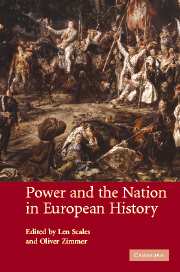Book contents
- Frontmatter
- Contents
- List of contributors
- Introduction
- PART I APPROACHES AND DEBATES
- PART II THE MIDDLE AGES
- PART III ROUTES TO MODERNITY
- 8 The state and Russian national identity
- 9 Ordering the kaleidoscope: the construction of identities in the lands of the Polish-Lithuanian Commonwealth since 1569
- 10 Nationhood at the margin: identity, regionality and the English crown in the seventeenth century
- 11 The nation in the age of revolution
- PART IV MODERNITY
- Index
8 - The state and Russian national identity
Published online by Cambridge University Press: 02 December 2009
- Frontmatter
- Contents
- List of contributors
- Introduction
- PART I APPROACHES AND DEBATES
- PART II THE MIDDLE AGES
- PART III ROUTES TO MODERNITY
- 8 The state and Russian national identity
- 9 Ordering the kaleidoscope: the construction of identities in the lands of the Polish-Lithuanian Commonwealth since 1569
- 10 Nationhood at the margin: identity, regionality and the English crown in the seventeenth century
- 11 The nation in the age of revolution
- PART IV MODERNITY
- Index
Summary
On the face of it, Russia appears to refute the modernist account of nationhood, since there modernisation actually weakened national identity. In the sixteenth and seventeenth centuries the elites and arguably many of the people of Muscovite Rus' had a lively sense of their ethnic identity and of their role in the world. Modernisation, launched by Tsar Aleksei in the middle of the seventeenth century and intensified by Peter the Great in the early eighteenth, actually undermined that identity, as I shall explain below. On further examination, however, I believe it may be possible to rescue at least one version of the modernist approach, that which lays emphasis on the relationship between the state and the political community.
Let us begin with the ethnic myths. By the middle of the sixteenth century the peoples of Muscovite Rus' already possessed the six characteristics which Anthony Smith has posited as constituting an ethnie. Following the end of the Mongol overlordship and the collapse of the Byzantine Empire they found themselves living in the only sovereign Orthodox monarchy. They already possessed an agreed generic name, Rus', and Orthodoxy as a marker of their distinctive culture. Their sense of homeland was heightened by the dangers they faced on their various frontiers, and by the success of the princes of Moscow in overcoming those dangers and enlarging the frontiers. A myth of common ancestry and shared historical memories was added during the early sixteenth century by the ideologists of Church and state.
- Type
- Chapter
- Information
- Power and the Nation in European History , pp. 195 - 211Publisher: Cambridge University PressPrint publication year: 2005
- 3
- Cited by

